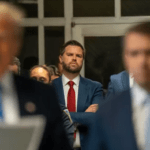A potential U.S. government shutdown at the end of September could add to worries about the economy going into year-end and beyond, investors said.
Current funding for most government programs expires on Sept. 30. If lawmakers are unable to pass a new budget by then, large swathes of government functions would shut down, an event strategists at Goldman Sachs estimate would reduce U.S. economic growth by 0.2% for each week it lasted.
A partial closure of the government, which will not interfere with essential functions like the military or Social Security payments, is not seen to be as toxic to the economy as a failure to increase the government’s debt limit, an outcome lawmakers narrowly avoided earlier this year.
Past shutdowns’ impact on U.S. stocks, meanwhile, has been slight: the S&P 500 has fallen by an average of 0.4% in the week before a shutdown, and gained a total of 0.1% over the length of all shutdowns since 1976, according to CFRA Research data.
Investors might be more sensitive to a shutdown this time around, however. Failure to pass a budget would highlight the gridlock and political instability that ratings agency Fitch cited as a reason for its downgrade of the U.S. credit rating in August, a move that roiled markets last month.
At the same time, a shutdown could lead to spending cuts that may dampen the economy at a time when other factors, including the Federal Reserve’s monetary policy tightening and the resumption of payments on student loans, loom as a threat to growth, analysts said.
Resilient growth in the face of higher interest rates has helped power the S&P 500 (.SPX) to a nearly 16% gain this year, though the index is off some 4% from its July highs following a surge in Treasury yields that has spooked some investors.
“You’re going to get some reduction in government spending because that’s the only way that these bills will pass,” said Jamie Cox, managing partner for Harris Financial Group, who is growing more bullish on defensive sectors such as healthcare. “That will create a meaningful slowing of the economy.”
Hard-line Republicans in the House Freedom Caucus have insisted they will not support the spending bills necessary to fund the government for its next fiscal year without paring discretionary spending to $1.47 trillion, $120 billion below the level agreed to by House Republican Speaker Kevin McCarthy and President Joe Biden.
Goldman Sachs estimates that such a reduction would amount to a cut of 0.6% from the current U.S. gross domestic product.
With only weeks to go before the deadline, the Republican-led House of Representatives has approved only one of those 12 bills. Spending and tax measures normally originate in the House before moving to the Senate.
Source : Reuters












